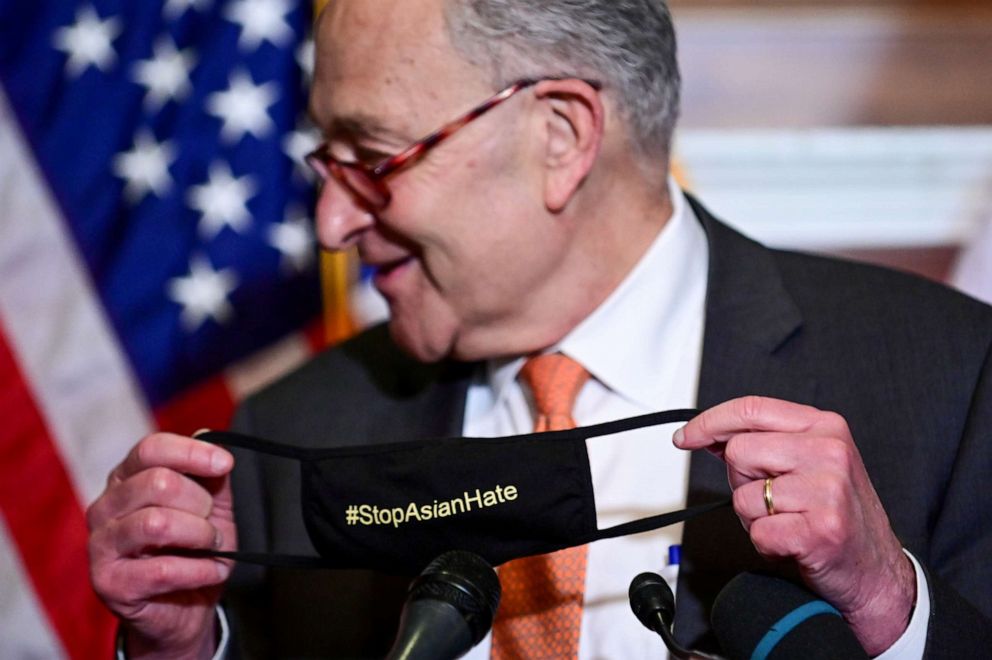Anti-Asian hate bill clears Senate with bipartisan support
Sen. Josh Hawley, R-Mo., was the lone dissenting vote on Thursday.
The Senate voted 94-1 in favor of an amended bill aimed at combatting the rise in anti-Asian hate crimes. The resounding vote proved an increasingly rare show of across-the-aisle goodwill in the evenly divided Senate.
Sponsored by Sen. Mazie Hirono, D-Hawaii, the legislation takes relatively modest steps to equip law enforcement and communities to better deal with the rise in attacks against Asian American and Pacific Islanders. It also requires the Department of Justice to appoint or designate someone to assist with an expedited review of hate crimes.
"This long overdue bill sends two messages: to our Asian American friends, we will not tolerate bigotry against you, and to those perpetrating anti-Asian bigotry, we will pursue you to the fullest extent of the law," Senate Majority Leader Chuck Schumer said in floor remarks shortly before the vote Thursday. "We cannot -- we cannot allow the recent tide of bigotry, intolerance and prejudice against Asian Americans go unchecked."

"By passing this bill, we tell our law enforcement agency to prioritize anti-Asian violence, and wield the sword to detect, deter and prosecute, hate crimes of all variety. We send a clear message, a unified message that hate has no place in America," he continued.
Sen. Josh Hawley, R-Mo., was the lone dissenting vote on Thursday.
"It's too broad," he said in a statement to ABC News. "As a former prosecutor, my view is it's dangerous to simply give the federal government open-ended authority to define a whole new class of federal hate crime incidents."
Schumer applauded the Senate for working across the aisle to garner robust support.
"The vote today on the Anti-Asian hate crimes bill is proof that when the senate is given the opportunity to work the Senate can work to solve important issues," Schumer said.
The bill now heads to the House, where House Majority Leader Steny Hoyer told ABC News he anticipates it will move expeditiously.
"Addressing AAPI hate crimes remains a top priority for House Democrats," Hoyer said.
"We will take action on this issue soon," he added.
President Joe Biden has already backed the legislation and urged Congress to act swiftly.

Alongside Sen. Tammy Duckworth, D-Ill., Hirono introduced the legislation after the shooting of eight people, including six Asian women, at several spas in the Atlanta area last month. That shooting followed a general rise in anti-Asian sentiments across the United States.
Hirono, who is Japanese American, said she's been experiencing the rise in anti-Asian sentiments since the start of the pandemic.
"It certainly gives me pause," Hirono said on ABC's "The View" on Monday. "I used to walk around listening to audio tapes with my ear pods on. I don't do that anymore, I need to be very aware of my surroundings."
The non-profit reporting organization, Stop AAPI Hate, documented nearly 3,800 incidents over a year during the COVID-19 pandemic.
Republican Leader Mitch McConnell said earlier this month that he would support this bill with the appropriate amendments. He referenced the experiences of his wife, former Trump administration official Elaine Chao.
"I can tell you as a proud husband of an Asian American woman -- I think this discrimination against Asian Americans is a real problem," McConnell said at a press conference last week. "It preceded the murders that were recently on full display. I'm hoping we can work out an agreement to get on the bill in a normal way, have some amendments, and move forward to final passage."
Most Republicans supported the legislation after a series of behind-the-scenes bipartisan discussions yielded several changes.
One of those changes, which was a chief focus for Republicans, secures a tweak in language in the original bill that tied hate crimes to the COVID-19 pandemic.
Sen. Susan Collins, R-Maine, and other Republicans had expressed concern that proving this link would be too onerous for law enforcement officials.
An amendment offered by Collins and Hirono struck that language, allowing the bill to apply more broadly. Still, Hirono and other Democrats have been insistent that the rise in anti-Asian sentiments is tied to the COVID-19 pandemic.
They said the blame falls partially on former President Donald Trump, who referred to COVID-19 as the "China Virus" and "Kung Flu."
The Senate-passed bill also contains an amendment from Sens. Richard Blumenthal, D-Conn., and Jerry Moran, R-Kan., to provide additional money for states and localities to establish hotlines for hate crime reporting. Their amendment also allows judges to assign hate-crime perpetrators rehabilitative work within the community that they targeted.
ABC News' Mariam Khan and Lauren King contributed to this report.